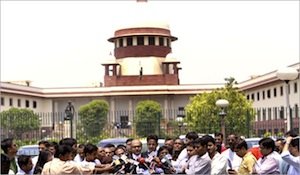We mention this again because there’s this part of the ruling
But on Wednesday, a Supreme Court bench of Justices Ranjan Gogoi and N V Ramana ruled that no one could have copyright over judgments delivered by the apex court. It could be reproduced in its raw form by anyone without the risk of being accused of infringing copyright, the bench said, settling a long-standing dispute.
Good to see a level playing field (or sort of). In the US there’s elements of the level playing field concept but in jurisdictions like Australia where witless lawyers/public servants have handed over the job to Reed or TR on an exclusive basis thus making it impossible for smaller, smarter industry sector publishers to get a look in and offer a range of products to different clients across different industry sectors.
We could bang on about this for ever but what’s the point, it is what it is.
Here’s the rest of the Times of India report
The question before the bench was whether the Lucknow bench of Allahabad High Court was correct in restraining Reed Elsevier India Pvt Ltd from reproducing judgments reported in ‘Supreme Court Cases’ (SCC) published by Eastern Book Company.
Eastern Book Company had argued that the SCC was based on its editors reading the entire judgment, understanding the questions of law and facts involved and then labelling it as ‘concurring’, ‘partly concurring’, ‘dissenting’, ‘partly dissenting’ or ‘supplementing’.
“In these tasks, the editor uses sound judgment, creativity and legal skill. A very significant role done by the editor is to input the references, clarifications and explanations to the raw text of the judgments, either in the text or as footnotes and, most importantly, he puts editorial notes and comments,” Eastern Book Company’s counsel K V Vishwanathan had said.
Reed Elsevier, through senior advocate Pratibha Singh, said there could be no copyright over words like ‘concurring’, ‘partly concurring’, ‘dissenting’, ‘partly dissenting’ and ‘supplementing’ as these were generic words commonly used in legal parlance. It also said judgments published by Eastern Book Company “are nothing but a verbatim reproduction of judgments reported by the Supreme Court website”.
Top Comment
EBC– Eastern Book Company, based out of Lalbagh, Lucknow, made uncouth sums of money by pretending it had the copyright on Judgement of Supreme Court Cases. Good that the myth is broken, and future … Read More
candu with time
The bench did not enter into the dispute. It refused to determine whether the words used to qualify the nature of a judgment could be claimed as copyright. It merely clarified that there was no copyright over judgments uploaded on the judgment section of the Supreme Court’s website and that all were free to use it as a raw source.
This ruling from the apex court will permit new players in the legal publishing field to print SC judgments in book format and challenge the monopoly of a few firms.
http://timesofindia.indiatimes.com/india/No-copyright-over-our-judgments-SC/articleshow/55591798.cms




